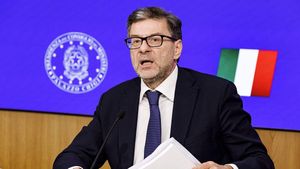The political storm surrounding Italy's handling of the Osama Njeem Almasri case continues to brew, leading to serious criticisms and intense debates within the Italian Parliament. On February 5, Justice Minister Carlo Nordio and Interior Minister Matteo Piantedosi presented their accounts to lawmakers about the controversial expulsion of Almasri, who had been accused of crimes against humanity.
Almasri, the former head of Libya’s judicial police, was arrested on January 20, 2023, after being tracked by Interpol but was released and expelled back to Libya just days later. His case has sparked outrage among opposition parties, particularly after it was revealed the charges against him were linked to serious violations of human rights committed under the regime of Muammar Gaddafi.
During the parliamentary session, Minister Nordio faced pointed criticism from opposition leader Elly Schlein of the Democratic Party (PD), who accused him of acting as Almasri's defense attorney rather than fulfilling his duty to uphold justice. Schlein remarked, "You were not speaking as a minister but as the lawyer for a torturer," referencing Almasri's past as a significant figure in Libya's abusive police state.
Nordio defended the government’s actions, insisting they were based on legal and procedural concerns. He claimed the arrest warrant issued by the International Criminal Court (ICC) was rife with inconsistencies and arrived without proper translation, making it challenging to act upon. According to Nordio, the document was delivered to the Justice Ministry only after Almasri was already detained: "The notification of arrest came after he was already apprehended. The communication was made without the necessary translations, leaving us at a considerable disadvantage," he stated.
The debate intensified when Piantedosi reaffirmed the government's position, stating, "Almasri was expelled for reasons of state security and public order." His comments were met with skepticism from opposition members, who questioned how someone flagged internationally for serious allegations could be allowed to leave Italy so swiftly.
One key element of the turmoil stems from allegations of political interference and procedural failures. Critics argue there was negligence on the government's part to process the ICC's request more diligently. For the opposition, the government's unresponsiveness reflects broader systemic issues within Italian politics and law enforcement.
Piantedosi countered these claims, asserting, "No pressure or threats were received during this process. Our actions were strictly based on our national security needs." This remark was met with protests from opposition lawmakers, who accused the ministers of downplaying the severity of the charges against Almasri.
Schlein raised specific questions about the protocol followed, positing the idea of direct government complicity or negligence. She asked, "If the allegations were baseless, why expedite his return to Libya? Why allow such rapid action if the facts weren’t clear?"
The session saw frequent interruptions from opposition members who displayed banners reading, "Meloni, where are you?" and "Patriot on the run?" directed at Prime Minister Giorgia Meloni, who chose not to attend the discussions, leading to accusations of evasiveness. Schlein's fiery exchanges underscored the growing frustration among legislators who seek accountability.
Defending their course of action, Nordio focused on the legal framework surrounding Almasri's arrest warrant, indicating it was poorly constructed, with many points remaining unclear. "The ICC acted hastily and with many legal missteps. It is my intention to seek clarifications directly with the ICC about these inconsistencies," he remarked, outlining the government's confidence to proceed without hesitation on judicial reforms.
Piantedosi's testimony highlighted the rationale of national security as the primary concern justifying Almasri's return to Libya. He explained the decisions made were intended to prevent potential risks associated with Almasri's presence on Italian soil, stating, "We had to act swiftly due to the inherent risks of his continued presence within our borders. His expulsion was unavoidable under the circumstances presented to us."
The situation created ripples throughout Italy's political framework, with calls for increased transparency and integrity from the ruling coalition. The discourse centered around not just the immediate fallout from the Almasri case but the larger implications for Italy’s dealings with international judicial bodies and the treatment of accused individuals who might pose threats.
With both ministers confirming their willingness to provide additional information and clarification, the public and lawmakers alike await the government’s next move. Meanwhile, the atmosphere remains embittered as lawmakers from opposing sides prepare for what seems to be another contentious parliamentary session filled with inquiries and scrutiny aimed at discovering the truth behind Almasri's hasty departure.
This case is emblematic of the tensions existing between legal protocol and political agendas within Italy, raising questions about the integrity of decisions made at the intersection of law enforcement and international diplomacy.



